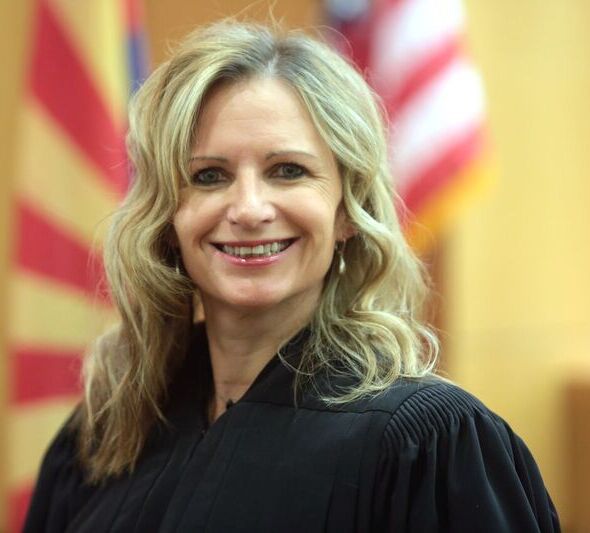Judge Pamela Gates’ background in client-oriented legal practice influences her belief in using technology to optimize the legal system and ensure impartiality, allowing her to advocate for the use of GenAI to enhance the quality and accessibility of justice
The post is part of a limited series of blog posts and podcasts presented by the Thomson Reuters Institute, Revolutionizing Rights: AI and the Future of Legal Equality, that will provide perspectives on the use of AI in the legal sphere
Judge Pamela Gates has worked hard to foster a legal atmosphere that’s centered on the people served by the courts and that champions the cause of equitable justice for all. Judge Gates has been a member of the Maricopa County Superior Court in Arizona since 2009 and currently acts as the Associate Presiding Judge. In that role she has been committed to promoting progress, impartiality, and excellence in the judicial system.
In addition to her judicial duties, Judge Gates chairs and is a member of various committees tasked with evaluating the potential for artificial intelligence (AI) to improve judicial proceedings, along with the challenges and prospects it presents for the evolution of legal systems.
In conversations about AI and the courts, Judge Gates often clarifies the key difference between AI and generative AI (GenAI), in that AI is a broad term that refers to any system or machine that can perform tasks that normally require human intelligence, such as reasoning, learning, decision-making, natural language processing, computer vision, and speech recognition. GenAI, on the other hand, is a subset of AI that can create new data or content from existing data or content, such as text, images, audio, or video. For example, GenAI can generate realistic faces of people who do not exist or write coherent paragraphs of text on a given topic or at in a specific style.
Optimizing the journey through the legal system
Prior to her judicial appointment, Judge Gates work at a very prestigious law firm. Her background in managing a client-oriented legal practice — with an emphasis on optimizing the client’s journey through the legal system and court proceedings — has influenced her perception of how technology could benefit the public good. “I believe there may be future merit in ensuring judicial officers recognize their own possible biases, and in employing predictive AI or other tools to help ensure impartiality,” she said.
Her support of AI and GenAI often prompts a critical inquiry into the constraints associated with employing GenAI within legal proceedings. Judge Gates acknowledges the technology’s capability to generate original content or information, yet it falls short of substituting human discernment and decision-making. “I am convinced that GenAI will not supplant the human element of judicial decision-making, which entails the assessment of facts and the subsequent application of these assessed facts to the law,” she explains.

“I think courts need to — if they haven’t already — start assessing the impact of Gen AI on the courts. They need to immediately begin evaluating what AI and GenAI tools already are here and what’s going to be coming.”
This is a critical distinction — GenAI can help in the lead-up and analytical stages of litigation, but it can never substitute humans as the final arbiter of cases.
One of the challenges that Judge Gates often discusses is the digital divide — the gap between those who have access to information and communication technologies (such as computers, smartphones, and the internet) and those who do not. The digital divide can affect various aspects of social and economic life, such as education, health, employment, civic participation, and justice. The digital divide also can be influenced by factors such as income, education, age, gender, race, geography, and disability.
Bridging the digital divide
Judge Gates emphasizes the need to balance the benefits of technology with the risks of creating or widening the digital divide, especially for members of marginalized or vulnerable groups who may not have access to online platforms. “I think it’s that making sure that we can make our courts and our systems more accessible to people, but just as important, we must make sure that we don’t increase that digital divide,” she says.
She also urged the courts to be proactive and prepared for the inevitable changes that AI will bring to the legal landscape. “I think courts need to — if they haven’t already — start assessing the impact of Gen AI on the courts,” she explains. “They need to immediately begin evaluating what AI and GenAI [tools are] already here and what’s going to be coming” Courts and other legal professionals need to start assessing the tools that are out there and determine which ones people should use and which they should avoid using, she says, adding that, more importantly, courts need to understand what happens when citizens access or use some of these tools and who now has access to it.
Clearly, Judge Gates is someone who is not afraid to embrace innovation and challenge the status quo. She is revolutionizing the rights of the people by using technology as a tool for empowerment and equity.
Judge Gates is a trailblazer in the field of law and technology, who advocates for the use of GenAI to enhance the quality and accessibility of justice. She is aware of the opportunities and challenges that both AI and GenAI pose for the legal system, and she is committed to finding solutions that balance the needs and rights of all stakeholders.
You can hear more insights from the Hon. Pamela Gates on a special edition of the Thomson Reuters Institute Insight podcast, on Spotify







